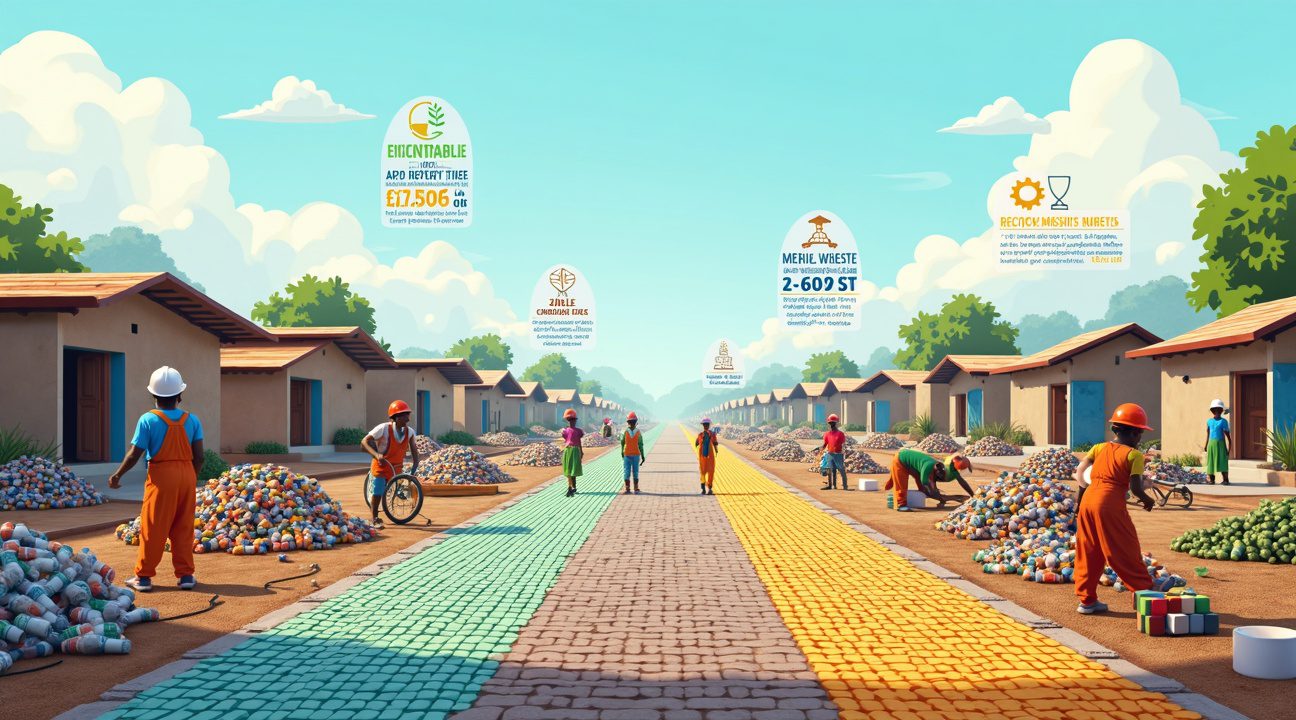Engineer Nzambi Matee founded Gjenge Makers, a Nairobi-based startup that converts Kenya’s plastic waste crisis into high-quality construction materials. The company creates bricks from recycled plastic waste that demonstrate nearly seven times the strength of concrete while delivering 30% cost savings. This approach establishes a powerful circular economy model that tackles both environmental pollution and affordable housing needs simultaneously.
Key Takeaways
- Superior Performance: Gjenge Makers’ plastic bricks deliver up to seven times the strength of traditional concrete while maintaining a 30% cost advantage and reduced weight for easier construction.
- Significant Environmental Impact: The company processes 225-500 kilograms of plastic waste daily, having diverted over 20 tons from Kenya’s waste stream that generates approximately 500 metric tons of plastic waste each day.
- Ambitious Scaling Plans: Current production of 1,500 bricks per day is set to more than triple to 5,000 bricks daily through strategic equipment upgrades and expanded partnerships with waste collectors and manufacturers.
- Economic Empowerment: The startup provides stable employment for 112 people, primarily women and youth, while founder Nzambi Matee received UN recognition as a Young Champion of the Earth in 2020.
- Versatile Applications: The bricks are successfully used in paving, road construction, and various building projects, with plans to diversify into roofing tiles, wall panels, and other construction products to address Kenya’s housing crisis.
Kenyan Engineer Creates Bricks That Are Seven Times Stronger Than Concrete and 30% Cheaper
I find Gjenge Makers’ innovative approach to construction materials absolutely fascinating. The Nairobi-based startup transforms plastic waste into building bricks that deliver remarkable performance advantages over traditional concrete alternatives. These revolutionary bricks achieve strength levels up to seven times greater than conventional concrete while maintaining a 30% cost advantage.
Engineer Nzambi Matee founded this groundbreaking company with a dual mission. She recognized that Kenya’s growing plastic waste crisis could become the solution to another pressing challenge – the need for affordable, high-quality construction materials. Her vision has created a perfect circular economy model where environmental problems become economic opportunities.
Superior Performance and Cost Benefits
The bricks produced by Gjenge Makers offer several compelling advantages that make them attractive to builders and developers:
- Exceptional strength – up to seven times stronger than traditional concrete bricks
- Significant cost savings – 30% cheaper than conventional building materials
- Reduced weight compared to concrete alternatives
- Enhanced durability that minimizes long-term maintenance expenses
- Versatile applications for paving houses, schools, and streets
The lighter weight characteristic proves particularly valuable in construction projects. Builders can reduce structural load requirements while maintaining superior strength properties. This combination of reduced weight and increased durability creates long-term value that extends well beyond the initial cost savings.
I believe the maintenance cost reduction represents one of the most significant advantages these plastic bricks offer. Traditional concrete materials often require frequent repairs and replacements, especially in harsh weather conditions. The enhanced durability of Gjenge Makers’ bricks translates to lower lifecycle costs for property owners and developers.
The versatility of these bricks makes them suitable for diverse construction applications. From residential paving projects to educational facilities and public infrastructure like streets, the material performs consistently across different use cases. This adaptability positions the product as a comprehensive solution rather than a specialized alternative.
Matee’s engineering background enabled her to develop a manufacturing process that maintains quality consistency while scaling production. The company’s success demonstrates how innovative technologies can address multiple societal challenges simultaneously.
The environmental impact extends beyond waste reduction. By creating a valuable end product from discarded plastic, Gjenge Makers incentivizes proper waste collection and processing. This approach transforms waste management from a cost center into a revenue-generating activity for communities.
Construction companies have embraced these plastic bricks for their reliability and performance characteristics. The predictable quality and consistent availability make project planning more straightforward compared to traditional materials that may face supply chain disruptions.
The 30% cost advantage becomes even more compelling when considering the total cost of ownership. While the initial purchase price offers immediate savings, the reduced maintenance requirements and extended lifespan create additional value over time. This economic proposition appeals to budget-conscious developers and government agencies responsible for public infrastructure projects.
Gjenge Makers has proven that sustainable solutions don’t require performance compromises. The company’s success challenges conventional thinking about waste materials and demonstrates the potential for circular economy businesses in developing markets. The model has attracted attention from investors and environmental advocates who recognize the scalability potential.
The startup’s growth trajectory reflects strong market demand for both environmental solutions and cost-effective construction materials. As awareness of plastic waste issues increases globally, similar innovative partnerships between environmental responsibility and economic opportunity will likely emerge.
Matee’s achievement showcases how engineering expertise combined with entrepreneurial vision can create transformative solutions. Her work demonstrates that addressing environmental challenges can generate profitable business opportunities while delivering superior products to consumers.

Transforming 500 Kilograms of Daily Plastic Waste Into Building Materials
Gjenge Makers has developed a revolutionary manufacturing process that converts substantial amounts of plastic waste into high-quality building materials. The company processes between 225 to 500 kilograms of plastic waste daily, turning what was once environmental pollution into valuable construction resources. This impressive daily output represents a significant step forward in addressing Kenya’s mounting plastic waste crisis.
The Manufacturing Process Behind the Innovation
The brick production relies on specialized machines developed by Nzambi Matee that blend recycled plastic waste with sand to create the final building material. These custom-designed machines enable precise mixing ratios that ensure consistent quality and strength in every brick produced. The process transforms discarded plastic bottles, bags, and containers into durable construction materials that outperform traditional alternatives.
Sand serves as the binding agent that works with the melted plastic to form a composite material stronger than conventional concrete blocks. The manufacturing system can handle various types of plastic waste, making it adaptable to different waste streams commonly found in urban environments. This flexibility allows the company to maintain steady production levels regardless of fluctuations in specific plastic waste types.
Impact on Nairobi’s Waste Management Challenge
Nairobi generates approximately 500 metric tons of plastic waste daily, creating an enormous environmental burden for the city. Gjenge Makers’ daily processing capacity of up to 500 kilograms addresses a meaningful portion of this waste stream. While the company currently handles a fraction of the city’s total plastic waste, its operations demonstrate the potential for scaling up similar initiatives across Kenya and beyond.
The company has successfully repurposed over 20 tons of plastic waste to date, converting materials that would otherwise end up in landfills or pollute natural environments. Each kilogram of plastic waste diverted from disposal systems represents both environmental protection and economic value creation. The transformation process gives new life to materials that typically take hundreds of years to decompose naturally.
Expansion plans aim to increase processing capacity significantly, which could multiply the environmental impact while meeting growing demand for sustainable building materials. The scalability of the manufacturing process suggests that similar operations could be established in other Kenyan cities facing comparable waste management challenges. Artificial intelligence and automated systems could potentially enhance production efficiency as the company grows.
The economic benefits extend beyond waste reduction, as the company creates employment opportunities while producing construction materials at competitive prices. Local communities benefit from cleaner environments and access to affordable building supplies. The initiative also reduces the pressure on natural resources typically used in traditional brick and concrete production.
Manufacturing efficiency continues to improve as the company refines its processes and equipment. The ability to consistently transform hundreds of kilograms of waste daily into construction materials proves the viability of circular economy principles in developing nations. This approach creates value from waste streams while addressing critical infrastructure needs in rapidly growing urban areas.
The success of Gjenge Makers’ daily operations provides a model for other entrepreneurs looking to establish similar waste-to-construction material ventures. The combination of environmental stewardship and economic opportunity makes this approach particularly attractive for regions struggling with both waste management and housing shortages. As production capacity increases, the company’s contribution to solving Nairobi’s plastic waste problem will become even more significant.
Scaling Production From 1,500 to 5,000 Bricks Per Day
Gjenge Makers has established itself as a pioneering force in sustainable construction materials, currently churning out approximately 1,500 plastic bricks daily from their Kenyan facility. The company’s ambitious vision extends far beyond these current numbers, with concrete plans to more than triple production capacity to 5,000 bricks per day through strategic equipment upgrades and operational improvements.
The startup’s production model relies heavily on partnerships with informal waste collectors who gather plastic materials from across urban areas. These collectors form the backbone of Gjenge Makers’ supply chain, ensuring a steady stream of raw materials that would otherwise end up in landfills or polluting waterways. Additionally, the company has forged valuable relationships with manufacturers in the beverage and pharmaceutical industries, securing consistent access to industrial plastic waste that provides high-quality input materials for brick production.
Current Applications and Market Expansion
The versatile plastic bricks have already found practical applications across several construction segments. Current projects showcase their effectiveness in paving applications, where the bricks’ superior strength properties deliver exceptional performance compared to traditional materials. Driveways constructed with these innovative bricks demonstrate remarkable durability while maintaining cost advantages that appeal to budget-conscious consumers.
Road construction represents another significant application area where Gjenge Makers’ products excel. The bricks’ impressive strength characteristics, combined with their weather resistance properties, make them ideal for infrastructure projects that demand long-lasting solutions. Some projects have already begun incorporating these sustainable alternatives, proving their viability in real-world conditions.
Future expansion plans position the company to serve the broader construction sector through continued innovation efforts. Equipment upgrades will enable faster processing times and higher output volumes, allowing Gjenge Makers to meet growing demand from commercial and residential construction projects. The production scaling strategy focuses on maintaining quality standards while dramatically increasing throughput capacity.
Manufacturing efficiency improvements will play a crucial role in achieving the 5,000-brick daily target. The company plans to invest in:
- Automated sorting systems that can better categorize incoming plastic waste materials.
- Enhanced melting and molding equipment to reduce cycle times while maintaining precise manufacturing standards.
These improvements will ensure optimal material composition for each brick batch and preserve the exceptional strength properties that set Gjenge bricks apart.
Strategic partnerships continue to evolve as Gjenge Makers expands their reach within Kenya’s construction industry. Collaboration agreements with building contractors and infrastructure developers provide guaranteed purchase commitments that justify the significant equipment investments required for scaling operations. These partnerships also offer valuable feedback on product performance, driving continuous improvement in brick design and manufacturing processes.
The startup’s approach to scaling demonstrates how artificial intelligence paving the way for the future can be applied to optimize production workflows and quality control systems. Data-driven decision making helps identify bottlenecks in current operations while predicting maintenance requirements for critical equipment components.
Supply chain optimization remains essential for achieving production targets. Gjenge Makers continues expanding their network of waste collection partners, ensuring sufficient plastic materials flow into their facility to support increased output levels. Storage capacity improvements allow the company to maintain larger inventory buffers, reducing the risk of production delays due to material shortages.
Quality control protocols scale alongside production increases, with enhanced testing procedures ensuring every brick meets stringent strength and durability requirements. Advanced material testing equipment validates that each production batch maintains the performance characteristics that make these bricks nearly seven times stronger than concrete while remaining 30% cheaper to produce.
The construction industry’s growing emphasis on sustainable building materials creates favorable market conditions for Gjenge Makers’ expansion plans. Environmental regulations increasingly favor products that reduce waste and carbon footprints, positioning plastic bricks as an attractive alternative for environmentally conscious developers and contractors seeking compliance with green building standards.
Creating Stable Income for 112 Women and Youth While Building a Circular Economy
Gjenge Makers has transformed the economic landscape for over 112 individuals, with women and youth forming the backbone of this revolutionary venture. The company doesn’t just manufacture bricks; it creates meaningful employment opportunities that directly address Kenya’s unemployment challenges while tackling environmental issues simultaneously.
The startup’s hiring strategy focuses on empowering demographics that traditionally face barriers to stable employment. Women and young people often struggle to find consistent work in Kenya’s formal economy, but Gjenge Makers has created sustainable positions that offer regular income and skills development. These jobs range from waste collection and sorting to brick production and quality control, providing diverse pathways for economic participation.
Recognition and Global Impact on Circular Economy Principles
The company’s founder, Nzambi Matee, received international acclaim in 2020 when the United Nations Environment Programme (UNEP) named her a Young Champion of the Earth. This recognition highlighted how the startup exemplifies environmental entrepreneurship by converting plastic waste into construction materials. The award underscored the global significance of turning Kenya’s plastic waste problem into an economic opportunity.
Gjenge Makers operates on circular economy principles that create value from materials previously considered worthless. The company collects plastic waste that would otherwise end up in landfills or pollute waterways, then processes it into durable construction materials. This approach demonstrates how environmental solutions can generate employment while addressing multiple societal challenges.
The startup’s model shows that sustainable businesses can create lasting social impact beyond their primary environmental mission. By providing stable employment to 112 people, Gjenge Makers contributes to household income stability and community economic development. Workers gain technical skills in manufacturing processes, waste management, and quality assurance that enhance their long-term career prospects.
The company’s success illustrates how innovative solutions can address interconnected problems of unemployment, gender inequality, and environmental degradation. Each brick produced represents not just a construction material but a symbol of economic empowerment for women and youth who now have reliable income sources. This approach proves that environmental entrepreneurship can create meaningful employment while building a more sustainable economy.
The recognition from UNEP validates the global relevance of Gjenge Makers’ approach to combining social enterprise with environmental action. The startup demonstrates that innovative technologies and business models can create positive change across multiple dimensions simultaneously. By employing 112 people while converting plastic waste into valuable building materials, the company exemplifies how circular economy principles can drive both environmental protection and economic development in emerging markets.

Addressing Kenya’s Housing Crisis With Sustainable Innovation
I’ve observed how Gjenge Makers has positioned itself as a transformative force in Kenya’s construction landscape, tackling two critical challenges simultaneously: mounting plastic waste and severe housing shortages. This Nairobi-based startup represents more than a business venture—it embodies a complete reimagining of how developing nations can address infrastructure needs while managing environmental concerns.
Scaling Production to Meet Massive Demand
The company’s strategic focus on increasing production capacity addresses Kenya’s staggering housing deficit, which affects millions of citizens across both urban and rural areas. I see how Gjenge Makers’ approach differs from traditional construction methods by utilizing locally available plastic waste as raw material, creating a sustainable supply chain that doesn’t rely on expensive imports or finite natural resources.
Their production expansion efforts demonstrate remarkable foresight in meeting market demands. By converting discarded plastic bottles, bags, and packaging into durable building materials, the startup has created a scalable model that other African nations can replicate. The economic advantages become immediately apparent when considering the 30% cost reduction compared to conventional concrete blocks, making decent housing more accessible to Kenya’s growing population.
Diversifying Beyond Basic Building Blocks
Gjenge Makers’ diversification strategy extends far beyond simple brick production, encompassing a comprehensive range of construction products that can revolutionize entire building projects. I notice how this expansion allows contractors and builders to source multiple materials from a single supplier, streamlining construction processes while maintaining environmental benefits.
The company’s product line development includes various construction elements such as:
- Interlocking pavers for roads and walkways that withstand heavy traffic
- Roofing tiles designed for Kenya’s diverse climate conditions
- Wall panels suitable for both residential and commercial applications
- Decorative blocks that combine functionality with aesthetic appeal
- Foundation blocks engineered for different soil types across Kenya
This diversification strategy creates multiple revenue streams while addressing different segments of the construction market. Each product maintains the core advantages of plastic-based materials: superior strength, weather resistance, and cost-effectiveness that make them attractive alternatives to traditional building supplies.
The startup’s success has caught international attention, with development organizations and investors recognizing its potential for global expansion. I see how Gjenge Makers serves as a proof-of-concept for waste-to-wealth initiatives that could be adapted to different regional contexts and waste streams. Their model demonstrates that innovative technology solutions can emerge from necessity and local knowledge rather than requiring massive capital investments or foreign expertise.
Environmental impact data shows that every ton of plastic waste converted into building materials prevents approximately 500 kilograms of carbon dioxide equivalent from entering the atmosphere. This calculation includes avoided landfill emissions and reduced concrete production requirements, making Gjenge Makers’ operations carbon-negative in many scenarios.
The startup’s influence extends beyond Kenya’s borders, inspiring similar ventures across East Africa and other developing regions. I observe how their success validates the circular economy approach to development challenges, proving that environmental sustainability and economic growth can align perfectly when innovative thinking meets practical execution.
Kenya’s housing crisis requires urgent solutions that can scale rapidly while remaining affordable for average citizens. Gjenge Makers’ sustainable innovation model addresses these requirements by transforming abundant waste streams into essential building materials. Their approach creates employment opportunities in waste collection, processing, and manufacturing while reducing environmental degradation and construction costs.
The company’s trajectory suggests that environmentally conscious building solutions aren’t just viable alternatives—they’re becoming the preferred choice for forward-thinking developers and government agencies. As production capacity increases and product lines expand, Gjenge Makers continues proving that sustainable innovation can drive economic development while solving complex social challenges.

Global Recognition and Future Impact Beyond Kenya
I see Gjenge Makers’ innovative approach as a blueprint that could revolutionize construction across developing nations. Their transformation of plastic waste into building materials addresses two critical challenges simultaneously: environmental degradation and affordable housing shortages. This dual-purpose solution has caught international attention precisely because it demonstrates how environmental problems can become profitable business ventures.
Replication Potential Across Developing Markets
The model Gjenge Makers has established could easily adapt to countries struggling with similar waste management issues and construction material costs. Nations across Africa, Southeast Asia, and Latin America face comparable plastic pollution challenges while also needing affordable housing solutions. Their process doesn’t require sophisticated technology or massive capital investment, making it accessible for entrepreneurs in resource-constrained environments.
Several factors make this approach particularly attractive for international expansion:
- Abundant raw materials: Plastic waste is widely available in most developing nations.
- Low-tech requirements: The manufacturing process involves relatively simple equipment.
- High demand: Affordable and durable building materials are urgently needed.
- Policy alignment: Many local governments are supporting waste reduction and affordable housing efforts.
Economic and Environmental Synergy
I observe that Gjenge Makers has created a business model where environmental benefits directly fuel economic returns. Their approach proves that sustainability initiatives don’t require sacrificing profitability—instead, they can enhance it. The company generates revenue while removing harmful plastics from the environment, creating jobs, and providing affordable construction alternatives.
This synergy between conservation and commerce offers lessons for other environmental challenges. Similar principles could apply to ventures that:
- Transform organic waste into fertilizers
- Convert used tires into construction materials
- Process agricultural residues into building components
The key lies in identifying waste streams that can become valuable inputs for essential products.
The impact extends beyond immediate environmental cleanup. By creating economic incentives for plastic collection and processing, Gjenge Makers has established a circular economy model that could transform waste management practices globally. Their success demonstrates that artificial intelligence and innovative thinking can address complex societal challenges while building profitable enterprises.
Communities adopting similar models would benefit from:
- Reduced plastic pollution
- New employment opportunities
- Access to affordable building materials
- Improved public health through cleaner environments
- Economic empowerment through job creation
- Enhanced housing security through cost-effective construction options
This comprehensive approach to problem-solving positions Gjenge Makers as more than just a business—it’s a catalyst for systemic change that other entrepreneurs can study and adapt to their local contexts.
Sources:
World Architecture News – “Kenyan startup founder Nzambi Matee recycles plastic to make bricks that are stronger than concrete”
Waste360 – “Kenyan Woman Turns Plastic into Bricks”
Threads.com – “A Kenyan startup is turning plastic waste into bricks that are up to seven times stronger than concrete and 30% cheaper”
SWE Magazine – “Unbreakable Bricks: Transforming Plastic Waste”
Instagram (various accounts and reels)


